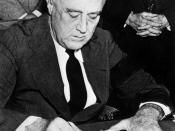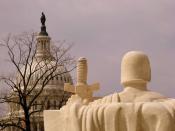"Using specific examples discuss how Madison's observations in Federalist Paper 51 apply to the relationship between the legislative branch and the modern president."
In order to keep the government from becoming too powerful and endangering the liberty of its people, the framers of the United States' Constitution endorsed the implementation of separation of powers so that the different branches of the government would keep one another in check. In Federalist Paper 51, Madison focused on the crucial relationship between the legislative and executive branches with the use of separation of powers. He stated, "In the republican government the legislative authority, necessarily, predominates. The remedy for this inconvenience is, to divide the legislative into different branches...[and] the weakness of the executive may require, on the other hand, that it should be fortified." While the separation of powers has successfully protected the liberty of America's people, it has also caused a continual struggle between the executive and legislative branch to gain power over matters such as the economy, the right to pass legislation, and control over the military.
Due to the prevalence of the legislative power severely limiting the authority of the executive, there is a large imbalance between the demands and expectations pressing in upon the President and his capacity to respond to them. The president cannot get his policies adopted by Congress without long delays and much bargaining. However, some fortification of the executive branch has allowed the president overcome some of these limitations in performing roles such as commander in chief, chief diplomat, and chief legislator.
The president holds the most authority as commander in chief than in any other role. While the Congress has the sole power to declare war, the president can send armed forces into a country in situations that are the equivalent of war. Numerous...



Long and informative but you got to cut to the point.
A lot of run on but hey great paper!!!
1 out of 1 people found this comment useful.